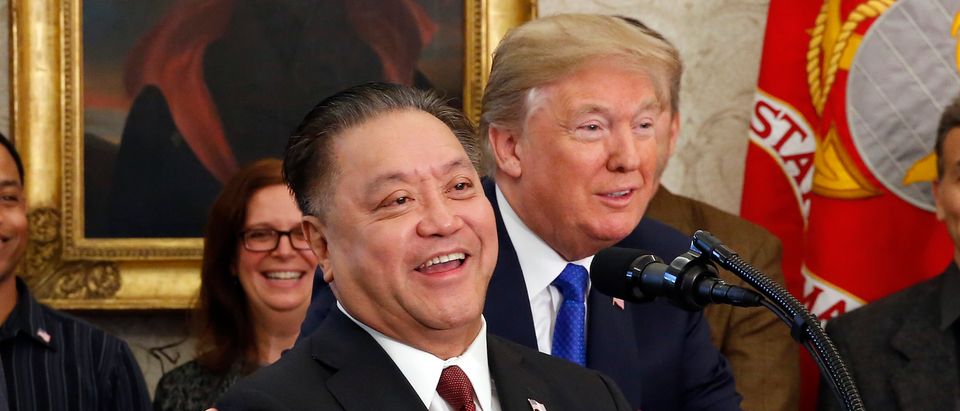- CFIUS is reportedly reviewing whether a company Singapore-based Broadcom can conduct a hostile takeover of chipmaker Qualcomm
- At least one senator and one representative want to block or delay the merger until it’s clear there is no risk to national security
- Broadcom has tangled with CFIUS last year over a different merger, but avoided action after promising to relocate to the US
The government may be investigating the national security implications of an apparent hostile takeover of semi-conductor manufacturer Qualcomm Incorporated by Broadcom Limited, which is currently headquartered in Singapore.
Texas Republican Sen. John Cornyn asked the Committeee on Foreign Investment in the United States (CFIUS), which reviews acquisition of U.S. businesses by overseas companies, to investigate the proposed merger and the potential risks to national security if it goes through.
“I urge CFIUS to promptly review Broadcom’s proposed acquisition of control of Qualcomm’s board, and to act prior to the March 6 Qualcomm meeting to address any national security concerns that may be identified,” Cornyn wrote to Secretary Steven Mnuchin Monday in a letter shared with The Daily Caller News Foundation.
CFIUS doesn’t comment on investigations, but persons familiar with the matter told Reuters the body had begun to review the matter.
A spokesperson for Broadcom, however, appeared to dispute whether CFIUS could block the proposed merger. “CFIUS is not implicated unless a corporation comes under the ‘control’ of a foreign person,” the spokesperson told TheDCNF.
Qualcomm has repeatedly rebuffed Broadcom’s offers, currently worth more than $80 billion, and now the company is poised to install friendly board members, who have allegedly accepted money from Broadcom and signed non-disclosure agreements, Cornyn wrote. The Qualcomm board meets March 6, and Broadcom hopes that shareholders will elect to the 11-member board six members favorable to the merger, the Los Angeles Times reports.
But Broadcom’s plans may hinge establishing its headquarters in the U.S. The company is currently located in Singapore, with offices in San Hose, Calif., and is in the process of restructuring to be a publicly traded company incorporated in Delaware, instead of Singapore. That will not be final until the end of Broadcom’s fiscal year May 6, the company said.
“We remain confident in our ability to complete a transaction with Qualcomm within approximately 12 months following the signing of a definitive agreement,” the spokesperson said.
“It would be deeply concerning if foreign parties were able to acquire control of U.S. companies through proxy fights for their boards without the action first undergoing a CFIUS review,” Cornyn wrote. Qualcomm, the nation’s largest semiconductor producer and at the cutting edge of 5G research and development, is critical to American security, according to the senator.
ALSO WATCH: Newsbreak: Something’s Different About CNN’s Trump Poll
During a public ceremony at the White House Nov. 2, Broadcom CEO Hock Tan announced to President Donald Trump and others that he would be moving his company to the U.S. That announcement came as CFIUS was reviewing a Broadcom’s bid to purchase Brocade Communications Systems, and days before reports that Broadcom was eying Qualcomm.
The two companies struggled to gain CFIUS’ approval, and had to refile at one point in October. Three weeks after the Oval Office ceremony, Broadcom announced that it had completed the acquisition of Brocade Nov. 17.
California Republican Rep. Duncan Hunter also appears interested in greater scrutiny of Broadcom’s acquisition of Qualcomm. “[Should] a deal materialize, I request that you block this sale pending a full security review and investigation,” Hunter wrote in a letter to Trump dated Thursday.
Even if the proposed takeover of Qualcomm goes through, Cornyn is concerned with the manner in which it has been conducted, and the potential disruption to the company’s work. “It is my view that failure by CFIUS to review this hostile takeover would potentially encourage other foreign parties to evade CFIUS review by taking control of the boards of sensitive U.S. businesses through proxy fights,” Cornyn wrote.
Follow Thomas Phippen on Twitter
Send tips to thomas@
All content created by the Daily Caller News Foundation, an independent and nonpartisan newswire service, is available without charge to any legitimate news publisher that can provide a large audience. All republished articles must include our logo, our reporter’s byline and their DCNF affiliation. For any questions about our guidelines or partnering with us, please contact licensing@dailycallernewsfoundation.org.


